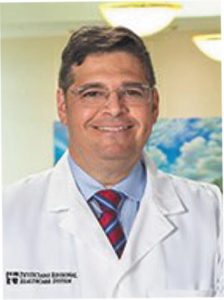
Physicians Regional Medical Group Welcomes Emilio Garrido, MD PhD, Board Certified in Psychiatry and Neurology. He speaks English, Spanish and Portuguese and specializes in the management of neurological conditions including epilepsy, peripheral neuropathy, headaches and botulin toxin, movement disorders including Parkinson’s disease, cognitive impairments/dementia, and neurological autoimmune disorders including multiple sclerosis.
His main areas of specialization is Epilepsy and seizures (as noted below). Epilepsy is one of the most common neurological problems. About 1.2% of the US population has active epilepsy. Seizures can occur at any age in life but onset is more prevalent during childhood and in elderly people. There are several types of seizures, from brief episodes of staring, losing awareness, problems with speech to convulsive seizures and it is very important to establish an accurate diagnosis to implement an effective and safe treatment plan. Most people with epilepsy can live a normal life with some limitations as soon as seizures are well controlled.
Every three seconds, someone in the world is diagnosed with a type of dementia, which is the general term for the loss of memory, language and ability to make decisions enough that it impacts everyday life. Caused by damage to brain cells, dementia is becoming increasingly more common and a leading cause of disability and dependency among older Americans. However, evidence suggests living a healthy lifestyle could help prevent severe cognitive decline and a dementia diagnosis.
“Today, there’s no cure for dementia so our best course of action is to prevent the condition from developing,” says Dr. Emilio Garrido, M.D., PhD, a physician with Physicians Regional Medical Group. “Making a lifelong commitment to healthy living is our best bet for reducing the risk of dementia and increasing our quality of life.”
Dr. Garrido completed his M.D. at the Institute of Medical Sciences of Havana in 1994. Then received his Ph.D. in Neurology/Neurosciences at Universidade Federal de Sao Paulo-Escola in 1999. He pursued his Epilepsy Fellowship at Department of Neurology, Mayo Clinic, Rochester, MN and his Neurology Residency at Stony Brook Hospital Stony Brook, NY.
After his training, Dr. Garrido was the Senior Associate Consultant in Neurology and Director EEG Lab at La Crosse Mayo Clinic Health System, WI. He obtains a license to practice medicine in Florida, Wisconsin, Minnesota, and Texas and is a member of the American Epilepsy Society and American Academy of Neurology.
Dr. Garrido recommends these lifestyle changes for preventing dementia and living a healthier life:
. Eat fresh food: A regular diet of processed and packaged foods is associated with a higher risk of dementia according to the American Academy of Neurology. Keep your brain and body healthy with whole fruits, vegetables, nuts and lean protein.
. Learn new things: Continuously challenge your mind with new activities and hobbies. Mental exercises like puzzles, card games or painting can help maintain cognitive function.
. Manage blood pressure levels: High blood pressure, or hypertension, can damage blood vessels in the brain, and if left unchecked could also lead to serious conditions like heart attack and Stroke.
. Remain social: Keep up with family, friends or get involved in your community through clubs and other organizations. Maintaining a social life can greatly benefit memory, ward off loneliness and improve mental health.
. Stay active: Cardiovascular exercise increases blood flow and oxygen to the brain and reduces the risk of cognitive decline. Just 30 minutes a day, five times a week of moderate exercise helps to maintain mental sharpness and improve overall health.
Dr. Garrido says, “I have found that many patients with hearing loss are not compliant with using hearing aids due to a stigma, or other reason, but recent studies have linked development of dementia and/or worsening of cognitive function to not using hearing aids. I also found patients that are clearly experiencing hearing problems, but they have never seen an audiologist or ENT.” According to these studies, with limited hearing, your brain has limited opportunity to process language, and it appears that you forgot something that you never hear in the first place, but also chronically the decrease input of information (via auditory channels, and processing) will cause some cognitive decline (use it or lose it).
Physicians Regional Medical Group offers a range of care for brain, spinal cord and nervous system conditions. Our care includes extensive diagnostic capabilities, advanced treatment and rehabilitation and recovery services. Our doctors treat a wide range of neurological conditions, including everything from headaches and sleep disorders to stroke, seizures, multiple sclerosis and other disorders of the brain, spine and nervous system.
Also discuss with a primary provider to screen for any possibility of depression, as this can also cause a cognitive problem, and, in some cases, patients with depression have been misdiagnosed with dementia (pseudodementia).
Maintaining good and healthy sleep hygiene, new studies show that you need at least a minimum of six hours of healthy, and refreshing sleep. Problems like insomnia, sleep deprivation, obstructive sleep apnea may affect quality of sleep and lead to cognitive difficulties including memory problems, poor attention and concentration, headaches, etc.
An extreme deterioration in cognitive abilities is not a normal part of the aging process. If you or a loved one are experiencing memory issues, schedule an appointment now.
Emilio Garrido Sanabria, M.D., PhD
www.physiciansregionalmedicalgroup.com
(239) 348-4221
6376 Pine Ridge Rd., Naples, FL 34119









